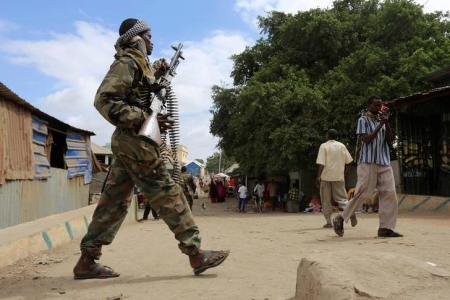
By Abdiqani Hassan
BOSASSO, Somalia (Reuters) – Islamist insurgents killed four pro-government Somali soldiers and injured 11 others when a roadside bomb destroyed a military pickup in the north of the country on Tuesday, the military said.
Al Shabaab claimed responsibility for the attack in the Galgala hills, an insurgent stronghold about 30 km (20 miles) to the southwest of Bosasso, the largest city in the region.
“A roadside bomb destroyed our pickup as we drove from Galgala hills today. We lost four soldiers, including a female soldier, and 11 men from our forces were injured,” Major Mohamed Ibrahim, a military officer in the semi-autonomous region of Puntland, told Reuters.
Sheikh Abdiasis Abu Musab, al Shabaab’s military operation spokesman told Reuters by telephone: “We completely destroyed the military pickup outside Bosasso – none escaped – all 17 soldiers on board perished.”
The insurgency routinely exaggerates the number of casualties killed in its attacks.
The deaths come as hundreds of forces allied to the Western-backed government prepare to retake the northern port town of Qandala from a group that has splintered from al Shabaab and pledged allegiance to the Islamic State group. [nL8N1DT3OC]
Qandala is about 70 km to the east of Bosasso and has been under the control of Abdiqadir Mumin, a Somali insurgent leader, for about a month.
“We are also evaluating the situation and we shall attack the IS as soon as possible,” Jamac Mohamed Khurshe, the mayor of Qandala told Reuters on Tuesday. Hundreds of pro-government militia began moving towards Qandala on Monday.
Somalia has been riven by civil war for more than 25 years. Al Shabaab, which has ties to al Qaeda, is fighting the government to impose their own strict version of Islamic law but has lost much of the territory they used to control.
Mumin’s group, which renounced al Shabaab in favour of Islamic State, is not thought to number more than a couple of hundred fighters. It has no publicly known operational links to Islamic State in the Middle East.
(Additional reporting by Feisal Omar and Abdi Sheikh in Mogadishu; Writing by Katharine Houreld; Editing by Alison Williams)











